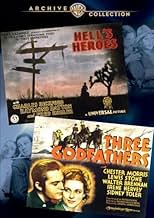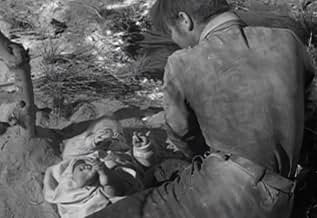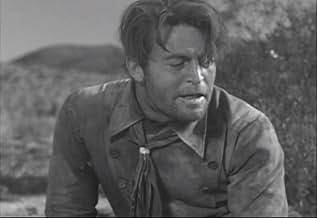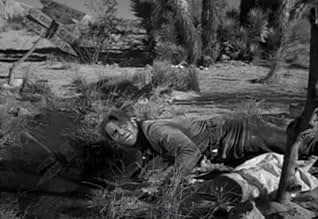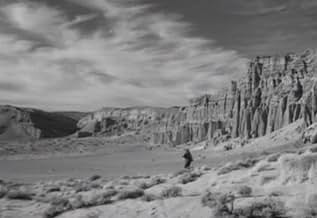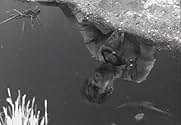CALIFICACIÓN DE IMDb
7.3/10
1.1 k
TU CALIFICACIÓN
Tres prófugos arriesgan sus vidas para llevar a un bebé recién nacido del desierto a un lugar seguro.Tres prófugos arriesgan sus vidas para llevar a un bebé recién nacido del desierto a un lugar seguro.Tres prófugos arriesgan sus vidas para llevar a un bebé recién nacido del desierto a un lugar seguro.
- Dirección
- Guionistas
- Elenco
Jean Kircher
- Baby
- (as Jean Kirchner)
Bernard Carr
- Ralph
- (sin créditos)
Richard Cramer
- Prospector Dancing with Blackie
- (sin créditos)
Opiniones destacadas
This touching moral lesson had been done as a silent version and in another version which is more known because of the renown of its director John Ford, but this version is equally as good as the latter version. Being an MGM version, it's a bit smaltzy as MGM movies of the thirties tended to emphasize that aspect of a story but director, Richard Boleslawski is able to keep the proceedings honest and true. Chester Morris, Lewis Stone and Walter Brennan are very good as the outlaws who ride into and rob a bank in a pious town - Chester Morris plays the "I don't give a damn" cowboy perfectly and with resonance. They make their getaway and in the desert find a baby, and the psychological issues of right and wrong as their paternal, maternal and surrogate parental instincts that exist in all of us take over. As they try to save the child, the trials and tribulations they go through bring out the best qualities of human nature in all of them in us, the audience, as well.
Not as well known as the 1948 John Ford version, this one does not spoon feed the issues to the viewer. Harsh, uncompromising and utterly devoid of false bonhomie, Boleslawski made this at almost the same time as the screwball classic, THEODORA GOES WILD.
In 1929 actor Chester Morris was nominated for an Oscar for his strong performance as an ex-con in Alibi; he spent a good deal of his life playing tough-guy roles, too often typecast in second-tier "B" roles; here, some six years later, he gives a dynamic, believable turn as the bad boy of the town, the man in black who revels in his nastiness, unredeemed by the love of a good woman or anyone else.
He and two others pal up together to rob a bank during a church social, and run for the hills, there discovering a dying woman with a child; this could be a really silly melodramatic set-up, but director Richard Boleslawski knows what he is doing, knows how much melodrama to inject into a situation, is able to focus two of the best scene stealers in the business, Walter Brennan and Lewis Stone into producing distinctively compelling characters.
This film is a remake of several silent versions, the most notable starring Charles Bickford in the Chester Morris role (and later, more sentimentally, by John Wayne in a color version from John Ford), but the sense of authenticity in the town scenes and the visually arresting desert scenery give the actors a canvas which they do not fail to brilliantly fill in.
How often does a character in a Western film recite Macbeth's "Tomorrow" soliloquy from memory, or discuss the intricacies of Schopenhauer with a friendly but uncomprehending cowpoke? Lewis Stone manages a nice turn in his interchanges with Walter Brennan, himself putting the brakes on his usual cornball rustic.
The transformation for Chester Morris from unregenerate bum to something admirable is powerfully done, and the intrusion of some 1930's sentiment not entirely unwelcome.
In 1936, the Best Oscar nominees were Paul Muni, Spencer Tracy, Gary Cooper, William Powell and Walter Huston; with a better agent, Chester Morris might have been among them.
This is apparently the second remake of this film. While I have not seen the two prior versions, I did see the 1948 John Wayne remake and the two films are different enough (especially the endings--I preferred the more realistic way it was handled in this version) and I recommend you see both. And, overall I strongly prefer this film to the 1948 one.
Chester Morris was the main star in this film, though today he's mostly been forgotten despite the many films he starred in during the era. The other two co-star bandits are Lewis Stone (yes, the kindly "Judge Hardy" from the Hardy Family series) and Walter Brennan. All did a competent job and the entire movie is well written and directed and is far more watchable than the average Western. About the only problem, and it's a minor one, is that occasionally the film becomes a little bit too melodramatic and heavy-handed. But it also gets high marks for being less predictable and more entertaining that what you usually find in the genre.
Chester Morris was the main star in this film, though today he's mostly been forgotten despite the many films he starred in during the era. The other two co-star bandits are Lewis Stone (yes, the kindly "Judge Hardy" from the Hardy Family series) and Walter Brennan. All did a competent job and the entire movie is well written and directed and is far more watchable than the average Western. About the only problem, and it's a minor one, is that occasionally the film becomes a little bit too melodramatic and heavy-handed. But it also gets high marks for being less predictable and more entertaining that what you usually find in the genre.
This was a complete surprise after seeing the John Wayne version first. First of all it is one of the toughest westerns I've seen from the 1930's. Chester Morris is remarkable in his role. The subtlety and naturalism in his acting is really unusual for a film from this era. He says things that would be delivered with a theatrical snarl in lesser westerns but here it comes off believable. Lewis Stone gives depth and Walter Brennan goes from annoying to sympathetic by the end of the film. The baby does a good job as well.
Most westerns from the thirties (especially the serials) are about as unbelievable as you can get and acted unnaturally as well. This film has a gritty realism that wouldn't be seen until the late 50's and the 60's. The script is intellectually well above many other films of the time as well. How many films have ever talked (even briefly) about Schopenhauer? The photography is very good and mostly out of the studio. The only problem the film has is that the actors never really look like they are in desperate health, especially the baby. Other than that I recommend this highly.
Most westerns from the thirties (especially the serials) are about as unbelievable as you can get and acted unnaturally as well. This film has a gritty realism that wouldn't be seen until the late 50's and the 60's. The script is intellectually well above many other films of the time as well. How many films have ever talked (even briefly) about Schopenhauer? The photography is very good and mostly out of the studio. The only problem the film has is that the actors never really look like they are in desperate health, especially the baby. Other than that I recommend this highly.
¿Sabías que…?
- TriviaWhen the godfathers are dying of thirst, Walter Brennan asks Doc about a person in the bible who brought water out of a rock. Doc replies that that was Moses. The same exchange is made in another Walter Brennan classic, Northwest Passage. Only there the men are dying of hunger and the actor asking the question is Spencer Tracey. Answering is Robert Young. Brennan only looks on.
- Errores(at about 45 mins) When Doc arrives to the place where the baby's mother is buried, there is a shadow covering only a small area where the rock pile and cross are. In the very next edit, the site is in total sunlight, with nothing nearby that could have cast such a shadow, too small and well-defined to have been cast by a cloud.
- Citas
Robert 'Bob' Sangster: There ain't no Santy Claus!
- ConexionesReferenced in El hombre increíble: Two Godmothers (1981)
- Bandas sonorasShe'll Be Comin' 'Round the Mountain When She Comes
(uncredited)
Traditional
Played at the Christmas social
Selecciones populares
Inicia sesión para calificar y agrega a la lista de videos para obtener recomendaciones personalizadas
- How long is Three Godfathers?Con tecnología de Alexa
Detalles
- Fecha de lanzamiento
- País de origen
- Sitios oficiales
- Idioma
- También se conoce como
- Three Godfathers
- Locaciones de filmación
- Productora
- Ver más créditos de la compañía en IMDbPro
- Tiempo de ejecución
- 1h 21min(81 min)
- Color
- Relación de aspecto
- 1.37 : 1
Contribuir a esta página
Sugiere una edición o agrega el contenido que falta

